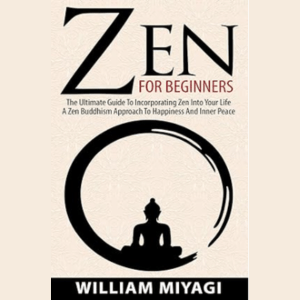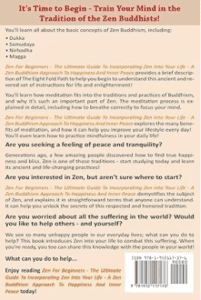Zen for Beginners : The Ultimate Guide to Incorporating Zen into Your Life – Expert Tips

Zen philosophy, with its emphasis on mindfulness, simplicity, and inner peace, has become increasingly relevant in today’s fast-paced world. In his book, “Zen for Beginners : The Ultimate Guide to Incorporating Zen into Your Life,” William Miyagi offers a comprehensive approach to integrating Zen principles into everyday life, paving the way for greater happiness and inner tranquility.
What Is Zen?
Zen is not just a philosophy; it’s a way of life. Rooted in ancient Buddhist traditions, Zen emphasizes mindfulness, meditation, and simplicity. It invites us to slow down, connect with our inner selves, and find serenity amidst life’s chaos. Zen emphasizes direct experience and insight into the nature of existence.
Exploring Inner Peace and Happiness
Central to Zen philosophy is the concept of inner peace, which arises from letting go of attachments and desires. By embracing the present moment and accepting things as they are, individuals can find profound happiness irrespective of external circumstances. Through meditation and self-reflection, Zen practitioners learn to quiet the mind and connect with their innermost selves.
The Eightfold Path: Your Roadmap to Enlightenment
Miyagi demystifies Zen by introducing The Eightfold Path, a revered set of instructions for life and enlightenment. Let’s explore some key concepts:
- Right View (Dukkha): Understand the nature of suffering and impermanence. Zen teaches us to accept life’s challenges with equanimity.
- Right Intention (Samudaya): Cultivate positive intentions and align your actions with compassion and wisdom.
- Right Speech: Use words that uplift and connect. Silence can be even more potent than words.
- Right Action: Live ethically and mindfully. Your actions ripple through the universe.
- Right Livelihood: Choose work that aligns with your values and contributes positively to society.
- Right Effort: Dedicate yourself to personal growth and transformation.
- Right Mindfulness: Be fully present in each moment. Meditation is a gateway to mindfulness.
- Right Concentration (Magga): Develop focused awareness through meditation.
The Art of Meditation
Meditation lies at the heart of Zen practice. Miyagi explains how to incorporate meditation into your daily routine. Here’s a glimpse:
- Breathing Techniques: Learn to breathe consciously. Each breath anchors you in the present moment.
- Zazen (Seated Meditation): Find a quiet spot, sit comfortably, and observe your thoughts without judgment. Let them flow like a river.
- Walking Meditation: Take mindful steps, feeling the ground beneath your feet. Connect with the earth.
Zen in Everyday Life
The beauty of Zen lies in its simplicity and applicability to everyday life. Whether washing dishes, walking in nature, or having a conversation, Zen encourages mindfulness and presence in every action. By bringing awareness to mundane activities, individuals can experience a sense of calm and clarity amidst the chaos of modern living. Zen isn’t confined to the meditation cushion. It infuses every aspect of your existence:
- Mindful Eating: Savor each bite. Be aware of the flavors, textures, and nourishment.
- Minimalism: Simplify your surroundings. Less clutter, more clarity.
- Nature Connection: Walk in the woods, listen to birdsong, and feel the breeze. Nature is a Zen teacher.
- Compassion: Extend kindness to others. We’re all interconnected.
Benefits of Zen Practice
The practice of Zen offers a multitude of benefits for mental, emotional, and spiritual well-being. Regular meditation cultivates resilience to stress, enhances concentration, and promotes emotional balance. Moreover, embracing Zen principles fosters deeper connections with others and a greater sense of compassion and empathy.
The world is filled with suffering. Zen equips you with tools to alleviate it. As you deepen your practice, you’ll find:
- Inner Calm: Even amidst chaos, you’ll discover an oasis of stillness within.
- Emotional Resilience: Zen helps you navigate life’s storms with grace.
- Purposeful Living: Zen guides you toward meaningful actions and relationships.

Share the Wisdom
When you’re ready, share the gift of Zen with others. Imagine a world where more hearts beat in harmony, where compassion flows freely, and where inner peace is contagious.
Applying Zen to Achieve Goals
Contrary to popular belief, Zen does not advocate passivity or indifference. Instead, it encourages individuals to pursue their goals with intention and clarity of mind. By aligning actions with Zen principles such as patience, perseverance, and non-attachment to outcomes, individuals can navigate challenges with grace and resilience.
Practical Tips for Zen for Beginners
For those new to Zen practice, getting started can seem daunting. However, incorporating simple habits like mindful breathing, daily meditation, and conscious eating can lay the foundation for a more Zen-like existence. Gradually incorporating these practices into daily routines can lead to profound shifts in perception and behavior over time.
Maintaining Consistency and Discipline
While the benefits of Zen practice are undeniable, maintaining consistency can be challenging amidst the demands of modern life. However, by prioritizing self-care, establishing a supportive community, and staying focused on the present moment, individuals can sustain their Zen practice even during turbulent times.
Deepening Your Zen Practice
As practitioners progress on their Zen journey, they may seek to deepen their understanding and explore more advanced techniques. From silent retreats to koan study to working with a teacher, there are myriad avenues for deepening one’s practice and uncovering new insights along the way.
Resources for Further Exploration
For those interested in delving deeper into Zen philosophy and practice, a wealth of resources is available. Books by renowned Zen masters, online courses, meditation apps, and local Zen centers offer avenues for continued learning and support. By immersing oneself in the rich tradition of Zen Buddhism, individuals can embark on a lifelong journey of self-discovery and transformation.
Get Your Copy of “Zen for Beginners: The Ultimate Guide to Incorporating Zen into Your Life” today! Let its ancient wisdom transform your existence. Remember, the journey begins within.
Get your copy here and embark on a path of enlightenment and serenity.
Conclusion
In conclusion, “Zen for Beginners: The Ultimate Guide to Incorporating Zen into Your Life” serves as a beacon of wisdom and inspiration for those seeking greater happiness and inner peace. By embracing the principles of Zen Buddhism and integrating them into daily life, individuals can cultivate a profound sense of well-being and fulfillment. As the world continues to grapple with uncertainty and upheaval, the timeless teachings of Zen offer solace, guidance, and a pathway to true liberation.
Frequently Asked Questions
- Is Zen Buddhism a religion?
While Zen has roots in Buddhism, it is more accurately described as a philosophy or way of life rather than a traditional religion. It emphasizes direct experience and self-realization over dogma or belief systems.
- Do I need to be a Buddhist to practice Zen?
No, Zen practice is open to people of all backgrounds and faiths. Its teachings are universal and can be applied by anyone seeking greater clarity, peace, and understanding in their lives.
- How long does it take to see results from Zen practice?
The benefits of Zen practice can vary from person to person. Some individuals may experience immediate improvements in their well-being, while for others, progress may be more gradual. Consistency and patience are key.
- Can Zen help with managing stress and anxiety?
Yes, many people find that regular meditation and mindfulness practice inherent in Zen philosophy can significantly reduce stress and anxiety levels. By cultivating awareness and acceptance, individuals can develop healthier coping mechanisms for dealing with life’s challenges.
- What is the role of a Zen teacher or master?
In Zen tradition, a teacher or master serves as a guide and mentor for students on their spiritual journey. They offer instruction, support, and insight, helping practitioners navigate the complexities of Zen practice and deepen their understanding of its teachings.


1 thought on “Zen for Beginners : The Ultimate Guide to Incorporating Zen into Your Life – Expert Tips”